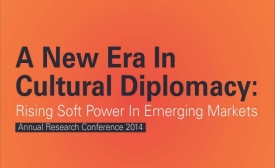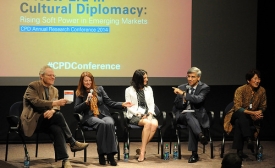emerging markets
As talks between Iran and six major powers on limiting its nuclear program enter the final stages of diplomacy this week in Vienna ahead of a July 20 deadline, global companies are fact-finding, meeting with potential Iranian partners and jockeying for position should an end to sanctions open the isolated economy.
Watch Andrew Pike discuss Britain's GREAT campaign.

Cultural diplomacy is often conceived of as part of a country’s foreign relations, in that cultural dialogue can sometimes achieve what political dialogue cannot. It is an example of “soft power”― the possibility of communicating through culture and ideas to achieve national interests.
In an increasingly distributed global system, emerging-economy countries are now paying greater attention to culture and communication as part of the symbolic domain of their national power in global affairs. But their efforts remain little understood or even noted.
Many investors have been stampeding out of emerging-market bonds, but they’re falling in love with Colombia. Investors have poured $622.5 million into Colombia’s bond market since the start of the year, the biggest inflow into any emerging-market country so far in 2014, according to fund flow tracker EPFR Global.
Many investors have been stampeding out of emerging-market bonds, but they’re falling in love with Colombia. Investors have poured $622.5 million into Colombia’s bond market since the start of the year, the biggest inflow into any emerging-market country so far in 2014, according to fund flow tracker EPFR Global.

Take a moment to see some of the photos from the USC Center on Public Diplomacy's 9th Annual Research Conference, “A New Era in Cultural Diplomacy: Rising Soft Power in Emerging Markets,” held on February 28th. Scholars and practitioners from 10 different countries shared their research and insights on the expanding phenomenon. This conference explored the cultural diplomacy efforts pursued by a number of countries with emerging economies.
Asia’s emerging markets remain on edge over the U.S. Federal Reserve’s actions, damaging investor confidence from India to Indonesia. However, a new survey by the World Bank suggests that foreign direct investment (FDI) flows won’t be drying up anytime soon. In its World Investment and Political Risk 2013 report released Thursday, the World Bank’s Multilateral Investment Guarantee Agency (MIGA) said macroeconomic instability and political risk ranked “neck and neck” as the top concerns for investors over the short and medium terms.







